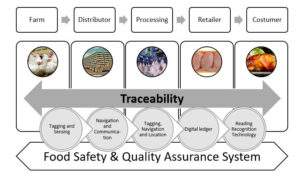Food Safety and Traceability
Food safety and traceability are crucial factors in the food industry. In recent times, the increasing awareness and concern about the quality and safety of food products have led to a focus on food safety and traceability. Food safety is the process of ensuring that food products are safe for consumption and free from harmful substances, while traceability refers to the ability to track a food product from the point of origin to the point of consumption. In this article, we will discuss the importance of food safety and traceability.

Ensuring Consumer Safety
The primary goal of food safety is to ensure that the food products consumed by individuals are safe and free from any harmful substances. The food industry is responsible for ensuring that the food products meet the standards set by regulatory agencies. Failure to do so can result in serious health issues for consumers. Foodborne illnesses can result from consuming contaminated food products, which can be fatal in some cases. The implementation of food safety measures helps to prevent the occurrence of foodborne illnesses and ensures the safety of consumers.
Protecting Company Reputation
Food safety is essential for protecting a company’s reputation. A company that has a history of producing unsafe food products can suffer significant losses in terms of revenue and reputation. Consumers are more likely to avoid purchasing products from companies with a history of producing unsafe food products. This can result in decreased sales and financial losses for the company. By ensuring the safety of their products, companies can protect their reputation and maintain the trust of their customers.
Complying with Regulatory Standards
The food industry is subject to numerous regulations set by regulatory agencies. These regulations are designed to ensure the safety of food products and protect consumers. Failure to comply with these regulations can result in fines and legal action against the company. By implementing food safety measures, companies can ensure that they meet regulatory standards and avoid penalties.
Improving Efficiency
The implementation of food safety and traceability measures can also improve efficiency in the food industry. Traceability systems can help companies to identify the source of any quality or safety issues quickly. This can help companies to take corrective action and prevent the spread of any potential issues. By improving the efficiency of their operations, companies can increase productivity and reduce costs.
Building Consumer Trust
Food safety and traceability measures can help to build consumer trust in the food industry. Consumers are becoming more conscious about the quality and safety of the food products they consume. By implementing food safety measures, companies can demonstrate their commitment to ensuring the safety of their products. This can help to build trust with consumers and increase brand loyalty.
Ensuring Sustainability
Food safety and traceability are also essential for ensuring sustainability in the food industry. Sustainable food production involves reducing the environmental impact of food production, improving food security, and ensuring that food products are safe and healthy for consumption. By implementing food safety and traceability measures, companies can ensure that their food products are produced sustainably and contribute to a more sustainable food system.
Implementing Food Safety and Traceability Measures
To ensure food safety and traceability, there are various measures that companies can implement. These include:
- Implementing HACCP (Hazard Analysis and Critical Control Points) systems: HACCP is a systematic approach to identifying and controlling hazards in food production. By implementing a HACCP system, companies can identify potential hazards and take measures to control them.
- Using quality control procedures: Quality control procedures involve testing food products at various stages of production to ensure that they meet quality and safety standards.
- Implementing traceability systems: Traceability systems involve tracking a food product from the point of origin to the point of consumption. This helps to identify the source of any quality or safety issues quickly.
- Training employees: Training employees in food safety and hygiene practices can help to ensure that they understand the importance of food safety and are able to implement food safety measures effectively.
- Conducting regular audits: Regular audits can help to identify any potential food safety issues and ensure that the company is complying with regulatory standards.
Importance of Food Safety and Traceability for Different Food Industries

Food safety and traceability are essential for different food industries, including:
- Meat and poultry industry: The meat and poultry industry is one of the most regulated food industries due to the potential risks of contamination and foodborne illness. Implementing food safety and traceability measures in this industry is critical to ensure that the products are safe for consumption.
- Dairy industry: The dairy industry also requires stringent food safety and traceability measures to prevent the spread of foodborne illnesses. Ensuring the safety of dairy products is essential as they are consumed raw or used in the production of other food products.
- Seafood industry: The seafood industry faces unique challenges due to the potential risks of contamination and spoilage. Implementing food safety and traceability measures in this industry is crucial to ensure that the products are safe for consumption and meet regulatory standards.
- Fresh produce industry: The fresh produce industry requires food safety and traceability measures to prevent the spread of foodborne illnesses caused by contamination of fresh fruits and vegetables.
- Food processing industry: The food processing industry involves the production of packaged food products, which require food safety and traceability measures to ensure that they are safe for consumption and meet regulatory standards.
Conclusion
In conclusion, food safety and traceability are essential for different food industries, including meat and poultry, dairy, seafood, fresh produce, and food processing industries. Implementing food safety and traceability measures in these industries is critical to ensure that the products are safe for consumption, meet regulatory standards, and contribute to a more sustainable food system. The increasing demand for safe and healthy food products has made it essential for the food industry to prioritize food safety and traceability measures.



